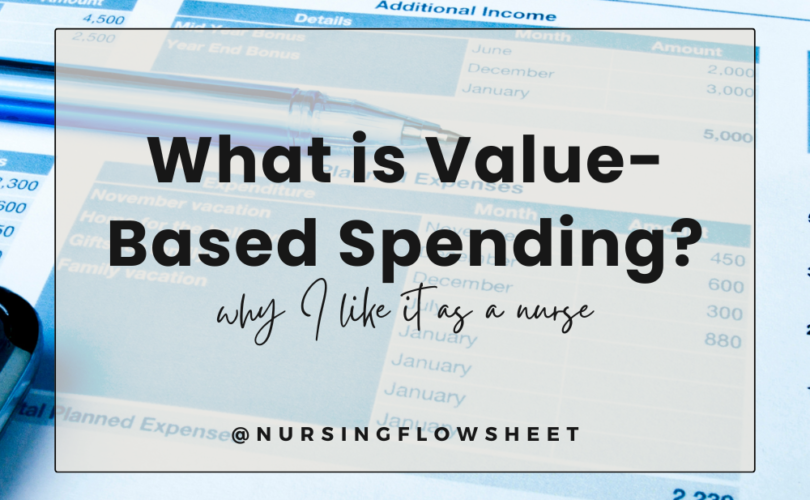As a nurse, I’ve spent years working in a profession that’s all about caring for others. Our days are filled with long hours, emotional moments, and the constant drive to make a difference. But, like many nurses, I’ve also struggled with managing my finances and finding a balance between enjoying life now and saving for the future.
That’s when I discovered value-based spending, and it completely transformed my financial mindset.
READ MORE: Budgeting for Beginners
What Is Value-Based Spending?
Value-based spending is the idea that you should spend your money intentionally, prioritizing the things that truly matter to you. It’s about understanding your values and aligning your spending habits with them, rather than mindlessly spending on things that don’t bring long-term happiness or fulfillment.
For me, this shift in perspective changed the way I approach money. Instead of feeling guilty for spending on things I enjoy or depriving myself of experiences, I now focus on making sure every dollar I spend brings value to my life. And this mindset has helped me create a more intentional and fulfilling financial life.
Why Value-Based Spending Matters for Nurses
As nurses, we work hard for every dollar we earn. It’s easy to fall into the trap of “treating ourselves” after a tough shift or spending impulsively to make up for the stress of the job. But over time, these habits can lead to financial stress and a feeling of never being in control of our money.
Here’s why I believe value-based spending is particularly powerful for nurses:
- Prioritizing What Matters Most: Whether it’s spending quality time with family, investing in your own health and well-being, or pursuing education to advance your career, value-based spending helps you direct your money toward the things that enrich your life.
- Avoiding Burnout Through Financial Freedom: When we spend mindlessly, we often feel the need to work overtime or pick up extra shifts just to make up for it. By spending intentionally, you’ll have more control over your finances and avoid the cycle of working extra hours just to maintain your lifestyle.
- Creating a Sustainable Financial Future: Nurses are often caught between wanting to enjoy life now and planning for retirement. Value-based spending allows you to do both by cutting out unnecessary expenses and focusing on what really matters, leaving more room for saving and investing for the future.
How to Be Intentional with Your Spending
Value-based spending isn’t about creating a strict budget or depriving yourself of life’s pleasures. It’s about making sure your spending reflects what you truly value. Here’s how you can start being intentional with your money:
1. Identify Your Core Values
Start by reflecting on what’s most important to you. Is it spending time with your family, traveling, furthering your education, or investing in experiences? Once you’ve identified your core values, you can start aligning your spending with those priorities.
For example, if spending time with family is important to you, you might cut back on dining out to save for family vacations or weekend activities that bring you closer together.
2. Track Your Spending
Before you can align your spending with your values, it’s essential to understand where your money is going. Start by tracking your spending for a month. Look for patterns—are you spending on things that don’t really bring you joy or fulfillment? Are there areas where you can cut back without feeling deprived?
Tracking your spending will help you spot those “leaks” where money is being wasted on things that don’t align with your values.
3. Cut Back on Non-Essentials
Once you’ve identified where your money is going, focus on cutting back on non-essential expenses that don’t bring lasting value. For example, maybe you’ve been spending a lot on clothing, but you’d rather save that money for a family trip or to fund a passion project.
Cutting back doesn’t mean giving up everything you enjoy—it’s about making space for what truly matters.
4. Be Mindful of Impulse Purchases
As nurses, we sometimes indulge in impulse purchases after long, exhausting shifts. And while it feels good in the moment, these spur-of-the-moment buys can add up over time and leave you feeling financially drained. Try creating a “cooling-off” period before making larger purchases—give yourself 24 hours to think about whether that purchase will truly add value to your life.
5. Invest in Your Future
Value-based spending isn’t just about enjoying life now—it’s also about preparing for your future. By focusing on what matters most, you’ll naturally create more space in your budget to save and invest for retirement, education, or even early retirement options.
As a nurse, retirement planning is crucial, especially if you want the option to retire early. By cutting out unnecessary expenses and prioritizing your values, you’ll have more money to put toward retirement accounts, investments, and savings.
6. Regularly Reassess Your Values and Spending
Your values and financial situation may change over time, so it’s essential to regularly reassess where you’re at. Check in with yourself at least once a year to ensure your spending still aligns with your current goals and values.
Final Thoughts
Value-based spending has given me the freedom to spend on what matters most without feeling guilty or restricted. As nurses, we have demanding jobs, but we also have the power to take control of our financial lives. By spending intentionally, we can reduce financial stress, enjoy life more fully, and build a sustainable future.
Whether it’s saving for early retirement, traveling, or simply being there for your family, value-based spending helps you focus on what’s truly important. The key is to be mindful of where your money is going and make sure it aligns with your deepest values—because when you spend with intention, you’re not just managing your money—you’re creating the life you want.





